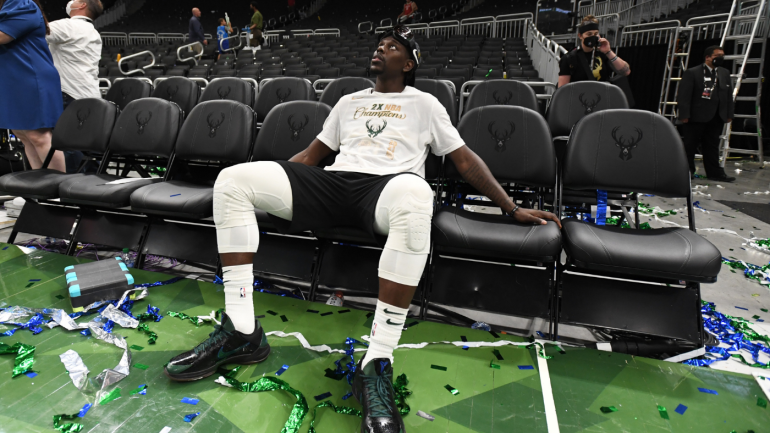
NBA owners frequently say that they are willing to pay the luxury tax for a team capable of contending for a championship, but never has that qualifier applied as directly as it does to the Milwaukee Bucks. By virtue of defeating the Phoenix Suns on Tuesday and clinching the franchise's first title since 1971, the newly crowned NBA champions now have to pay the luxury tax for the 2020-21 season. Why? Because, according to ESPN's Bobby Marks, Jrue Holiday has a $1 million championship incentive in his contract that triggered when the Bucks won it all.
Milwaukee actually began the season far above the luxury tax line. They made a series of aggressive offseason moves, including the addition of Holiday, that nearly pushed them up to the apron's hard-cap line (a figure that is typically around $6 million above the tax). This was done in part to help convince eventual Finals MVP Giannis Antetokounmpo to re-sign with the Bucks ahead of his possible 2021 free agency. He eventually did so, and that gave the Bucks a bit more freedom to shed salary.
They did just that at the deadline. The primary motivation in trading for P.J. Tucker was competitive, of course. He shored up Milwaukee's front-court rotation and proved to be a pivotal cog in their elite defense. But the Bucks traded both D.J. Augustin and D.J. Wilson to acquire Tucker and Rodions Kurucs (who was later waived). The two players they sent out cost roughly $1.5 million more than the players they brought in. Milwaukee continued to shed salary by trading Torrey Craig to the Phoenix Suns without taking any money back. That move almost proved fatal. Craig was a key piece of Phoenix's rotation in the Finals against Milwaukee, but ultimately, the Bucks were still able to overcome the Suns.
Thanks for signing up!
Keep an eye on your inbox.
Sorry!
There was an error processing your subscription.
All told, those moves pushed Milwaukee roughly $1.25 million below the tax line. They spent some of that room on midseason signings, with Jeff Teague serving as the most notable, but Holiday is ultimately the player that wound up pushing the Bucks back over the line. He received a $100,000 bonus when he was named First-Team All-Defense, a $200,000 bonus when Milwaukee reached the NBA Finals, and then another $1 million when they actually won the title, according to Marks.
To make this absolutely clear, there isn't a team in basketball that wouldn't willingly pay the luxury tax if it knew doing so would guarantee a championship. That, essentially, was the proposition for Milwaukee. The Bucks knew that they wouldn't have to pay the tax unless they paid Holiday all of those bonuses. Winning that title will wind up being very, very profitable for the team. Home playoff games are a financial goldmine and titles tend to justify price hikes on future ticket sales. Fans spend more money on champions. This isn't just a case of a team spending more money for a better on-court product. That extra money they're spending will have tangible financial benefits as well.
But it also creates future costs, and this championship could wind up being pricey for Milwaukee down the line. The repeater tax is significantly more punitive than the typical luxury tax and it triggers when a team has paid the tax in three or more of the previous four seasons. It doesn't matter how deep into the tax they went in any of those seasons, just that they paid it at all, which the Bucks now have. For some teams, this might not be an issue. Teams frequently go out of their way to dip below the line for a single season purely for the sake of delaying the repeater clock. But that isn't an option for Milwaukee.
The Bucks are already far above the projected tax line for next season thanks to new extensions kicking in for Holiday and Antetokounmpo. Re-signing P.J. Tucker and/or Bobby Portis would only push the Bucks deeper into tax territory, and the fact that Holiday, Antetokounmpo and Khris Middleton are all signed for at least three more seasons suggests that it is extremely likely that the Bucks will pay the tax in each of those seasons. In other words, by the 2023-24 campaign, the Bucks will almost certainly be paying the repeater tax rate. Depending on what other contracts they sign before then, they might end up paying it for multiple seasons.
Again, obviously, the Bucks are fine with that. They knew it coming into the postseason, and most owners are happy to pay a bit more for a championship. This one just didn't come cheap.
"pay" - Google News
July 21, 2021 at 12:52PM
https://ift.tt/3wYO6Ke
NBA Finals: Bucks to pay luxury tax after Jrue Holiday's championship bonus pushes team past threshold - CBS Sports
"pay" - Google News
https://ift.tt/301s6zB
Bagikan Berita Ini














0 Response to "NBA Finals: Bucks to pay luxury tax after Jrue Holiday's championship bonus pushes team past threshold - CBS Sports"
Post a Comment